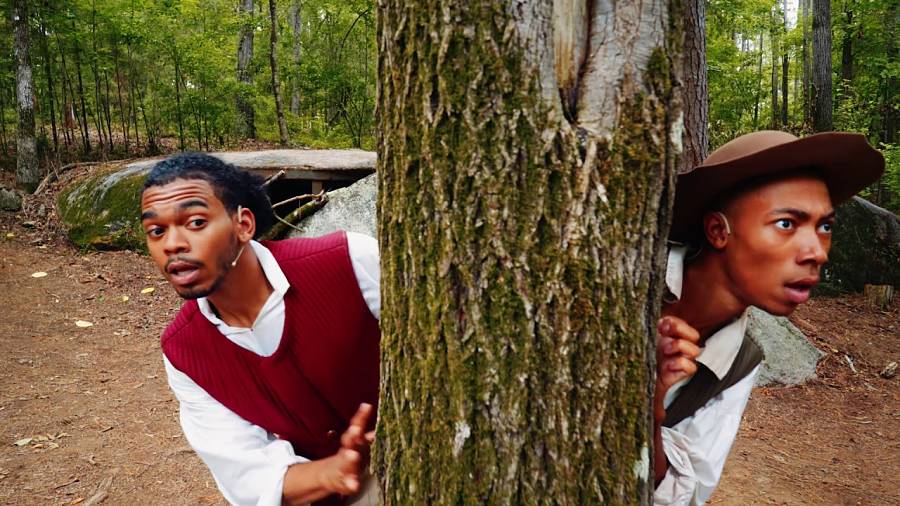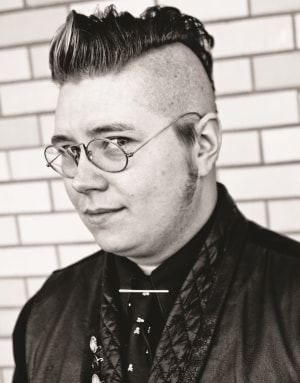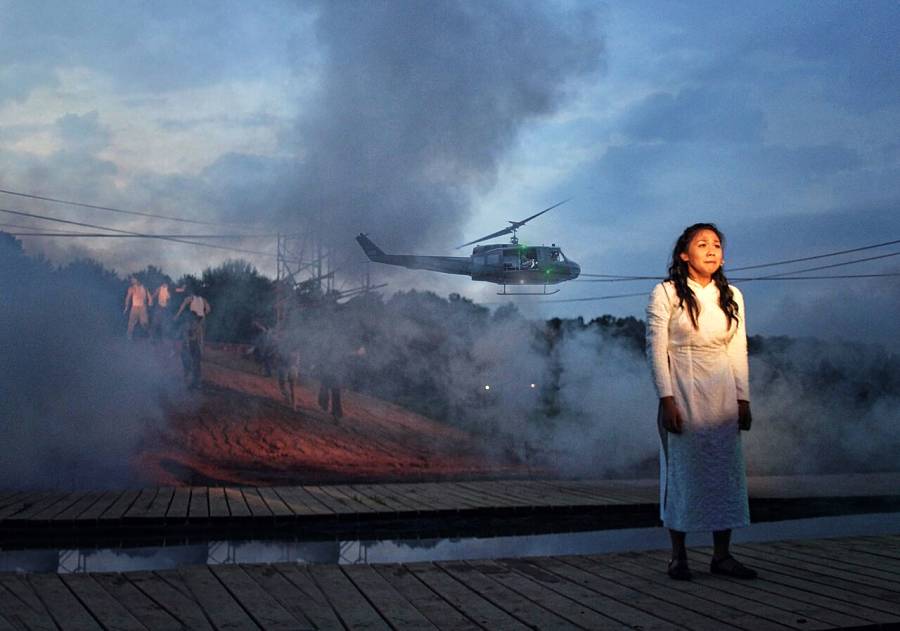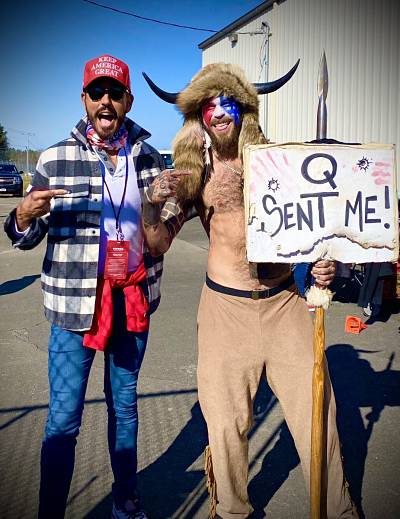To the outside world, in its heyday Serenbe Playhouse had a certain aura. An innovative theatre company that defied odds about what an outdoor, immersive playhouse could accomplish, it did things like stage Hair in an actual field or Oklahoma! with real horses. By the time the company—located in Chattahoochee Hills, Ga., a half hour from downtown Atlanta—revved it up several notches to include an actual helicopter landing as part of Miss Saigon or a four-story ship in real water for Titanic, Serenbe had attracted national acclaim (including in these pages).
Yet when Brian Clowdus, who founded the company in 2009 and served as its artistic director, resigned unexpectedly in the fall of 2019 to start Brian Clowdus Experiences, stories began to leak about what had gone on behind the scenes at the theatre. Allegations of racial insensitivity, unsafe work environments, and abusive behavior soon became so persistent that the Serenbe Institute—whose divisions included Serenbe Playhouse, as well as an artist residency program and Terminus Modern Ballet Theater—announced in the summer of 2020 that they would be closing the theatre company, laying off all staff, and forming a new, equitable, welcoming, and diverse playhouse. They even shed the Serenbe name altogether, changing their name to South Fulton Institute.
No definitive theatre plans have yet been announced by the reconstituted organization, however, and many visiting artists who worked at the company say the problems went well beyond Clowdus and his theatrical efforts. Meanwhile Clowdus—who did not respond to requests for comment on the allegations in this article—is in the midst of a bewildering new chapter as a Trump-loving conservative and political candidate, apparently having found one community that is unlikely to be fazed by reports of his tenure at Serenbe.

Among the first stories that emerged about problems with Clowdus’s regime at the theatre came via Tara Moses (she/her), a citizen of the Seminole Nation of Oklahoma and the Muscogee Nation, who went public in June 2020 with her experience directing The True Story of Pocahontas for Serenbe Playhouse in 2019. Moses wasn’t the first artist of color to speak out about her experiences there, but she thinks that because she was a director, people tended to listen to her more. She reported that during rehearsals, she had several calls with Clowdus, who told her he wanted a “happy” version of Pocahontas’s life, sent notes about making the title character “sexier,” and insisted on adding upbeat songs for a more Disney-esque version. Moses also noticed what appeared to be several OSHA violations, but when she expressed concerns, she said a production manager threatened her with violence in a production meeting. “It was entirely clear from the entire staff of Serenbe that they care more about spectacle than safety,” said Moses.
After experiencing what she said was overt racism from a stage manager, Moses filed a complaint with the Serenbe Institute. She said she was told by executive director Jennifer Bauer-Lyons (she/her) not to say anything to others involved with the production. Moses left Pocahontas before it even opened and never heard back about the investigation. Bauer-Lyons has disputed this account, and said, “Tara was courageous to bring issues up, and because she did we’ve gone through some major cultural organizational changes.”
Indeed, Serenbe’s many-layered organization is one reason many internal challenges to the theatre’s questionable practices seem to have been ignored or suppressed over the years. Alongside alleged incidents of racial and cultural insensitivity, the most consistent theme in accounts of experiences at Serenbe is a seemingly total disregard for workers’ safety.

The expression “Make it happen” was one technical director Spencer Estes (he/him) heard a lot at Serenbe. During the production of Titanic, Estes recalled, Clowdus wanted openings in the set’s scaffolding so that the cast could jump off of it into the water—from 40 feet in the air, into a lake that was a maximum of 12 feet deep.
“My concern was that there was stuff in the bottom of the lake—trash, whatever had been thrown in by fishers—and multiple times we’d find lines with loose hooks or branches that someone could impale themselves on if they jumped,” Estes said. “We cleared it out pretty well, but it was unsafe. I could not in confidence tell the actors they weren’t going to hurt themselves, but Brian did not want to hear details. He did not care. He had a lack of compassion for people who work on the tech side, and absolute tyrant behavior to get his vison to the stage no matter what cost.”
Clowdus, Estes said, also did not want to employ onsite EMTs, so the tech staff had to get some of the cast certified as lifeguards. But there was a snag here too, Estes said: Clowdus refused to let some of the people Estes suggested be certified as lifeguards because they did not fit the “Baywatch body type” Clowdus demanded.
Like Moses, Estes reported that he and his tech staff aired their concerns to various managers, but did not have the communication channels or the authority to go over Clowdus’s head to bring them to the Institute.
Estes’s fears about safety were apparently justified: The run of Titanic led actor Robert Wayne to spend nine days in the hospital. After spending some time in the bacteria-filled pond that housed the production, the actor’s leg—already bitten by a mosquito—started to swell, and eventually his quadricep tendon burst. He was unable to work for six months.

Washington, D.C.-based costume designer Erik Teague (he/him) recalled a similar shock when he arrived to work at Serenbe. Though he conceded that outdoor theatre is by its nature a hard job, working for Serenbe on projects such as The Snow Queen, he said, was like “anything you’d deal with in outdoor theatre, cranked up to an 11.” On his first trip to work with the company, he realized there was no infrastructure in place to do what he was asked to do, or to support performers.
Teague was particularly concerned in seeing what interns were asked to do. “I’d see them bleeding from being on sets they had no business being on, since they were not carpenters,” he said. “I’d see kids who were so sunburned and peeling that it looked horribly painful, or people being asked to go and do shows in stupid degrees of heat wearing clothes not intended for that. Interns were basically indentured servants to the company.”
He’s not far off: Apprentices/interns, hired for one-year stints, were paid $50 a week, and would work 8-12 hours a day, sometimes more, with Mondays and holidays off. All the apprentices stayed at the intern house just outside Serenbe, with up to 10 people per house and five to a room.
Gretchen Butler (she/her) worked for two years at Serenbe Playhouse (2015-17) as the managing director, then at Serenbe Institute (2017) as the director of operations. She was responsible for working with the apprentices, with orders funneled down by Clowdus. She does admit now that a lot was required of apprentices.

“The expectation was that they would do a family show in the morning, work front of house for a show, and then go straight into performance,” she said. “It was always complicated trying to find when there were any breaks or down time. When people get tired, when you are pulling 18-hour days, it gets harder to make sure everything is as safe as it can be.”
She said that for the most part the board of the Serenbe Playhouse let Clowdus do as he pleased. “I was literally in rooms in meetings with board members and leadership that said there were different sets of rules for Brian Clowdus,” Butler recalled. “It was hard as a staff member to implement changes that needed to be made when there were different rules for Brian.”
Garnie Nygren was at the time the Serenbe Playhouse board chair and director of operations for the community of Serenbe, a 1,000-acre planned development in South Fulton, described as a “biophilic community that connects people to nature and each other,” with cultural events and rental units available throughout the year. Nygren, also the daughter of the Serenbe founder Steve Nygren, was known among the board and leadership staff as the “Brian Whisperer,” according to Butler.
“Garnie wanted what Brian wanted,” Butler said. “The Playhouse was bringing thousands of people at the time to the community to shop, stay in the rentals, and eat in the restaurants. Garnie was focused on the money the Playhouse could make, and as long as the Playhouse was making money, it was very clear to me it didn’t really matter who got hurt on the way to making that money. Other people on the board tried to make incremental change, but when you have a few people in power it doesn’t matter.”
In short, Butler said, it was an environment where no wanted problems to be brought to the Playhouse board. Nygren did not return several attempts to reach her.

Another former Serenbe Playhouse employee was Ryan Oliveti (he/him), who worked for Serenbe Playhouse from 2013 to 2018, ending up as associate artistic director. It was demanding, he said.
“The working environment was very harsh and abusive most of the time,” Oliveti recalled. “You were outdoors, and people leading the charge were not the most understanding.” Both Butler and Oliveti said that apprentices who talked about the abusive nature of their work in exit interviews with the Playhouse and Institute boards weren’t asked back because they were deemed “difficult.”
Robert Hindsman (he/him), an actor and apprentice from the 2014-15 season, recalled his time at the company as being full of unsafe experiences. He and his fellow apprentices struck the set of Oklahoma!, and were told if they did so in two days they’d get a three-day break to go home. After the second day, they were told by Clowdus and Butler that they did not strike it well enough; the offer of a break was revoked until they did better.
Hindsman and Alex McSweeney (he/him), a fellow actor and apprentice, also said they were asked by Butler to strap a surrey on their shoulders and move it three miles. They refused, since it would have taken three hours, and were told in turn that they should be grateful for the opportunity they were being given. McSweeney also remembered a time he was told by Butler to retrieve new chairs for an oversold performance. He had to walk back and forth up a hill three quarters of a mile three times by himself, and Butler would not allow anyone else to help. When he finished, he was drenched in sweat and exhausted—and told by Butler to return immediately to the production. Butler said Clowdus was behind the strike decision and does not recall McSweeney’s version of the other events.
In addition to the theatre’s alleged disregard for workers’ health and safety are allegations of sexual harassment. Ryan Ortega (he/him) served as an actor and apprentice in the 2013-14 Serenbe season, appearing in productions of The Velveteen Rabbit and Hair before returning in 2016 for Miss Saigon. At his initial audition, Ortega said Clowdus seemed flirty with him, reminding the 19-year-old with a smirk on his face that he would need to be fully nude in Hair.

One night during his time as a company apprentice, Ortega found out he had been rejected by his university’s showcase. Sensing his young colleague’s disappointment, Clowdus asked Ortega to join him, several board members, and the Nygrens for dinner. Ortega wasn’t yet 21 and able to drink legally, but said Clowdus told him to order whatever he wanted from the server at the Serenbe restaurant and it would be okay. Drinks flowed heavily, and Ortega found himself intoxicated in a house where Clowdus and the company manager were staying. The next morning, Ortega said, he woke up to find Clowdus next to him making a sexual advance. He realized at the time he was not comfortable with it and asked Clowdus to stop. In subsequent days Ortega found himself pulling away even more from Clowdus.
This rejection didn’t sit well with Clowdus, Ortega said. “Any time I spoke up against the way we were being treated, he was nasty,” he said. “During Hair I spoke up against the way he was differentiating between people of color and the white cast members.” Ortega remembers Clowdus pulling him aside, almost physically assaulting him, and telling him, “If you ever want a job in this fucking town again, you will shut your fucking mouth!”
One morning, as Ortega was finishing a meet-and-greet session after a Velveteen Rabbit morning performance, he said an intoxicated Clowdus approached him and stuck his hands down the back of Ortega’s union suit pants. Ortega told a colleague about it at the time, but blocked the incident out of his memory until she later reminded him. As Ortega explained, he was a young kid who thought this was how theatre hierarchy worked and was afraid to speak up.
When he returned in 2016 to join the cast of Miss Saigon, one of his favorite musicals, Ortega hoped it would be a different experience. “I thought Brian had gotten his act together and Serenbe as a company had stepped up a bit. I had heard Brian had stopped drinking.”
It was a better experience in some ways, Ortega said, because of his love for the work and his camaraderie with his fellow actors. But working conditions at Serenbe were still as dangerous as he remembered. The much-ballyhooed helicopter was Clowdus’s sole concern, Ortega said, adding that no one ever checked on actors’ safety concerns about the chopper touching down just 50 feet from them. (UPDATE: A day after publication Steven Royal, who designed many shows for Serenbe, wrote to say that the helicopter in fact landed 200 feet away from performers, adding, “Almost everything was unsafe at Serenbe. However, the helicopter was the safest thing because of the dedicated pilots and their decades of training.”)
Former associate artistic director Oliveti also said he was mentally, physically, and sexually abused while employed at the Playhouse. “There were nights where Brian would get drunk and hands would go places where they should not have, and if he was in a bad mood he would hurl objects across the room,” Oliveti recalled. He chose not to report these incidents or file formal complaints with the Serenbe board members, he said, because he did not feel it would have made a difference, and that if anything it would have only made matters worse with Clowdus. Oliveti said he was frequently “told and suggested by board members that if I didn’t stay in line I would not have a career. The board was very much on his side, and actually worked to clean up and get rid of whoever they thought would be a problem.” According to Oliveti, around the time he had reached his limit and was preparing to leave, Clowdus beat him to the punch, firing him via email.

With Serenbe Playhouse gone and the Serenbe Institute’s makeover into the South Fulton Institute, the board insists the change is about broadening its vision.
“Our mission has always been to be a regional catalyst for arts, so this reflects that better,” said Deb Griffin (she/her), chair of the Serenbe Institute board since 2019, denying that the name was changed due to the recent controversies. Griffin has insisted that neither she nor Bauer-Lyons knew of the alleged incidents prior to their start dates, and that the Playhouse’s board did not tell them about any abusive or unsafe activities, though the two served on the Institute board in 2018 and 2019 alongside Nygren. According to Griffin, the Serenbe Playhouse’s own board was very protective of Clowdus. “I have no idea what went on with their board,” she said.

Bauer-Lyons joined in the fall of 2018 as the Institute’s interim managing director and became executive director in the spring of 2019. She said an investigation was conducted after Tara Moses and others filed complaints, and denied telling Moses she could not talk about her experience. Serenbe Institute has no official HR department, but a third-party firm does their consulting, and Bauer-Lyons said she is not at liberty to discuss HR findings. But since allegations have surfaced, she added, the company has been trying to reorganize.
Hailing Moses’s courage and crediting her testimony with prompting internal organizational changes, Bauer-Lyons added, “Some of it started when I came aboard as the AD, in terms of making sure there is a more diverse organization, serving more of South Fulton. We worked with a group of theatre artists in Atlanta and adopted an artistic values statement with a task force that was adopted by the entire organization in 2020.”
Many actors and crew who worked for Serenbe Playhouse over the years have been left with what they would described as scar tissue from their experiences. Some don’t want to revisit the past, such as Terrence Smith, who publicly documented what he calls racist acts on Serenbe shows he worked on on his Facebook account last year but didn’t want to speak for this article, and and Lilliangina Quiñones, who listed microaggressions against Clowdus on her own Facebook page.
Others are even wary of the industry now. Some have stories to tell but only anonymously; others have signed NDAs that won’t allow them to talk, and others still don’t want to give Clowdus the press they know he desperately craves. As a whole, the Atlanta theatre community wonders if a situation like a Serenbe Playhouse can happen again. For Ortega, it cuts a lot deeper: His Serenbe stints left him with serious self-doubt about himself and his profession.
It took a village for what happened at Serenbe Playhouse to occur, and most of the central figures are still around, many of them quick to point fingers. Though she’s no longer on the Serenbe Institute board, Nygren still works at the community of Serenbe, while Butler has moved to Theatrical Outfit in downtown Atlanta, where she hired two former Serenbe employees: Oliveti as marketing director and Courtney Greever-Fries as production manager. Griffin and Bauer-Lyons both agreed that what happened over the years at Serenbe Playhouse was horrible, but claimed they share no complicity in any of it, saying they weren’t part of the Institute when most of the incidents were happening.

And what about the man at the center of this drama? Clowdus has not gone quietly. Two years after he left Serenbe Playhouse, Clowdus is attempting to mix MAGA politics with entertainment. Now residing in Panama City, Fla., he has declared himself a Trump-loving Republican, started GOProductions as part of Brian Clowdus Experiences, and is running for a seat in the Florida House of Representatives this fall.
Clowdus had planned new staging of Oklahoma! at Blue Toad Hard Cider, a brewery in Roseland, Va., in early August, but that run was canceled after theatre artists flooded the company’s Facebook page with messages with tales of Clowdus’s history. The show is now slated to open Aug. 19 at the nearby Mount Rouge Farm, also in Roseland, with a cast including right-wing activist James O’Keefe (yes, that James O’Keefe) as Curly.
True to form, Clowdus is milking the publicity for all he can, touting the cancellation at Blue Toad Hard Cider as an example of “cancel culture” run amok. On his Facebook page, O’Keefe writes, “I hope that by bringing my voice to the cultural arts, I can inspire others to break through the wall of bias and censorship currently dominating the entertainment industry.” A rep for Mount Rouge Farm told me simply, “Cancel culture is terrible,” before hanging up.
Clowdus also plans a return to Georgia, at an “undisclosed location” in the town of Newnan, with a show called The Salem Experience. Attempting to rub his supposed “cancellation” in the face of the Atlanta theatre industry, the show’s catchphrase is, “You Wanted a Witch Hunt…You Got One.”
Butler, his former colleague, still points fingers away from herself, and is prone to say she doesn’t recall allegations others have brought up about her. Yet she seems to be slowly acknowledging her role in what happened over the years. “I am not perfect,” she said. “I did not do the best I could in every moment, but I have worked every moment since then to do better and be a better person and leader.”
Oliveti goes further. He realizes that, though he himself faced abuse, none of that exonerates him for his complicity.
“It doesn’t excuse my behavior,” he admitted. “I was in a leadership position and should have done more and been louder. We all should have been.”
Jim Farmer (he/him) is editor-at-large for ArtsATL.
This story initially reported that Serenbe’s Miss Saigon production took place 2017.


